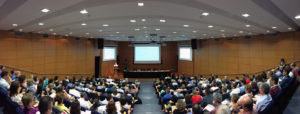By Abel L Packer
The Sixth Annual Meeting of SciELO Brazil, held on December 14, 2016 at FAPESP headquarters, dealt mainly with the future of journals, considering the national and global contexts and constraints. There are growing questions about the publication of journals that motivate reforms and innovations, among the main issues are the slowness of the publication process, which not rarely takes more than a year; the efficiency of peer review; the reproducibility of research results; the high costs; the gaps in the integrity of the evaluation processes and the articles themselves; and the use of journal impact factor as a proxy for research quality, a situation that mainly affects the journals published in Brazil and in many other developing countries, etc.
However, even with a broad recognition of the persistence of problems and the continuous search for improvements, there was consensus about the relevant role of journals in the filtering, validation and communication of new knowledge generated by research. Likewise, the importance of the SciELO Program and its innovative continuity in favor of strengthening the infrastructures and capacities of scientific communication in Brazil was reaffirmed, a fact that is extended to the other 14 countries that participate at the SciELO Network. Irrespective of the depth of the reforms that will occur in scholarly communication, journals will continue to exist in the exercise of qualifying research results.
As usual, the meeting analyzed the state of progress of the SciELO Brazil Collection and the perspectives that shape its future in the short, medium and long term, and for that, it relied on the proactive collaboration of experts in contemporary issues of scholarly communication and prestigious SciELO journal editors. The conditions and national policies that affect the development of journals and the advancement of international scholarly communication have permeated the structure of the meeting program of presentations, analyses and debates. Information about the experts and editors who composed the program, as well as the presentation files are available at the program page on the meeting website. The image below highlights the invited speakers. Click on it to access the meeting website.
The topics agenda of the Sixth Annual SciELO Meeting
The meeting program comprised three lectures and two panels of editors-in-chief of SciELO indexed journals. The first lecture, by Professor Sonia Vasconcelos from UFRJ, addressed integrity in scholarly communication with a focus on authors and editors responsibility. It is an always-relevant topic that was specially selected because, in the near future, SciELO will promote the improvement of the journals’ integrity controls in editorial management, especially the detection of plagiarism in English, Portuguese and Spanish languages and to explicitly attribute authorship responsibilities following best practices of the leading publishers and journals.
In the second lecture, I presented the progress made by SciELO in the light of the improvements achieved in the professionalization, internationalization and sustainability of the journals and the program, and indicating future challenges and perspectives. Subsequently, Professor Maria Helena Marziale coordinated the panel of editors-in-chief who debated the lines of action from their view points and experiences. Professor Lucas Massimo highlighted the efficiency and quality gains in editorial management that relies on up-to-date data on manuscript evaluation processes. Professor José Leopoldo Ferreira Antunes composed a broad framework of research internationalization and its communication from the area of Collective Health of Brazil and has alerted about the danger of falling into mere foreignization on the search for indicators. Closing the interventions of the panel, Professor André Felipe Cândido da Silva addressed the issue of sustainability, considering, on the one hand, the strengthening of the journal’s credibility, and, on the other hand, the different options for mobilizing financial resources. The three speakers concurred that it is the editor’s function to prioritize efficiency and quality in the processes of adopting the lines of action.
The third conference was a video showing a personal contribution to the SciELO Annual Meeting’s theme by Glenn Hampson, the Director of the Open Scholarship Initiative (OSI), who shared an entangled set of view points about the complexity involved in the analysis and proposals of communication reform, largely reflecting OSI’s analysis. The approach he presented on the future of journal publishing guided the debate that followed with the participation of Professors Elder Antônio Sousa Paiva, Suzana Caetano da Silva Lannes and Alexander W. Kellner, editors-in-chief of prestigious Brazilian journals. The panel actively drew the public’s attention and participation. Both the panelists’ and the public’s comments stressed the need for policies and authorities to adequately value Brazil’s journals through medium- and long-term support projects and the establishment of some system that recognizes the editors’ function in researchers careers. One manifestation that is repeatedly mentioned in editors’ meetings regards the questioning of the Qualis System of journal ranking that started to determine the submission flow of research of graduate programs. Under these conditions, the exclusion of the best journals in Brazil from the first categories of many of the Qualis areas of evaluation that are predominantly reserved for long-standing journals from developed countries is an almost insurmountable barrier to the emergence of high impact journals In the country. In other words, it is practically impossible for Brazilian journals to acquire high levels of international prestige without induction and depending only on the voluntary submission of quality manuscripts from graduate programs. On the other hand, the financial support programs for journal publishing from funding agencies operate on the basis of meeting the demands of costing of activities, products and services by means of grants almost always restricted to a year of duration, a procedure that limits the development of projects that seek performance goals in two or more years.
The central issue – the relevance of journals
The central issue that has permeated the presentations and discussions was once again the recognition of the relevance of Brazilian and SciELO journals in the development of national research. On the one hand, they provide scientific societies and associations, academic and development institutions, graduate programs, research groups and other communities with the ability to evaluate, edit and communicate Brazilian and foreign research, which are essential functions of scientific infrastructure and progress. On the other hand, they decisively contribute to the dissemination of nationally produced research that according to different reasons are more conformed to the nationally edited journals.
However, the relevance of journals is historically perceived through two indicators: presence and performance in international bibliographic indexes and by the contribution to the communication of national research. In the first indicator, the emergence and consolidation of SciELO as an index of international expression contributes to broaden the indexing coverage of journals from disciplines or editorial policies that do not meet the indexing criteria of international reference indices. In fact, 30% of SciELO journals are not indexed in Scopus or Web of Science (WoS).
Regarding the second indicator, the national policies that support internationalization of research communication of graduate programs, such as the Qualis Program, and the policies that support internationalization of journals such as the SciELO Program, contributed to significantly decrease the presence of Brazilian quality journals in communicating national research. This shift was most pronounced in the WoS index, when we consider the original research articles, review articles, and congress papers in Science Citation Index Expanded, Social Science Citation Index, and Arts and Humanities Citation Index. In this context, in 2006, prior to the WoS indexing expansion, Brazilian journals contributed with 18% of articles from Brazil, a proportion that increased to 35% in 2010 and dropped to 23% in 2015. In the same period, the proportion of articles from foreign affiliated authors doubled from 19% to 38%, while that of Brazil’s authors decreased from 86% to 69%.
The improvement of journals
Focused on the recognition of the relevance of Brazilian journals and considering the context of national policies that affect the development of journals and the advances and reforms that are occurring in international scholarly communication, SciELO has been promoting the improvement of journals according to three lines of action: professionalization, internationalization and sustainability. This improvement aims to contribute primarily to the proactive insertion of journals in the international flow of information and scientific knowledge. Keeping its missions and essential characteristics, the perspective is to make journals highly competitive in the flow of information and scientific knowledge.
The professionalization line of action should be mostly completed by 2017 for the SciELO Brazil collection and by 2020 for most of the SciELO Network collections. It includes the adoption of full-text XML markup in the Journal Article Tag Suite (JATS) standard according to the SciELO Publishing Schema, including formulas, tables and other components of the scientific articles; the use of an online manuscript management system that allows editors and authors to monitor the progress of manuscript assessment and provides publishers with up-to-date statistics and reports to support editorial management; the rapid publication of approved manuscripts through the continuous publishing modality with the prospect of reducing the median of publication time to six months and in future to three months; the publishing of research data; and, finally, active participation in social networks as a priority means of disseminating published research. SciELO journals are characterized by the high number of accesses (HTML files format) and downloads (PDF files) of the articles. In the last twelve months, only SciELO Brazil journals served a daily average of 760 thousand accesses and downloads. The expectation is that active participation in social networks will further increase this flow and may also contribute to accrue more citations.
The line of action of internationalization should be mostly completed by 2020 for the SciELO Brazil collection. The publication in English should reach 75% of the Brazil collection in 2018 with 40 to 50% of articles in Portuguese, considering between 15% and 25% published simultaneously in both languages; the editorial management with a minimum participation of 25% of foreigner editors should happen by 2019; and the recommended percentage of 35% of foreign authors is expected by 2023. Internationalization is the most controversial of the lines of action and to address it requires the active participation of the editors and institutions responsible for the journals and it is especially dependent on the disciplines and thematic areas covered by the journals. However, much of the future survival and relevance of Brazilian quality journals will depend on their active insertion into the flow of international scientific information, which will happen with the wide visibility of the research they publish and, at the same time, with the condition of internationally competitive vehicles to attract foreign authors.
The line of action of sustainability involves beyond the financial dimension, the preservation and continuous increase of the journal’s credibility and prestige. That is, sustainability is a combined product of the journal quality and the financial support it receives. In general, the Brazilian journals are financed by a mix of resources: the institution responsible for the journal, the research and scientific communication funding agencies, sponsors, authors who share costs such as translation, for example, and authors who pay for publication fees (Article Processing Charge). It is up to each journal to define their funding model based on one or more of these funding sources. An essential advance in financial sustainability is creating scale for contracting publishing products and services in order to minimize costs. Thus, scientific societies, universities and other institutions that are responsible for several journals or that can associate with each other for the publication of several journals, should negotiate common and financially advantageous solutions. In this regard, SciELO has been promoting a market of certified companies, products and services that combine quality and competitive costs, mainly with productivity gains due to technological innovations. By developing this market with a broad platform of solutions serving all journals, SciELO positions itself as a Metapublisher.
These three lines of action develop in a complementary and convergent way in the collective effort to improve journals.
The evolution of the digital edition promoted by SciELO
The main objective of SciELO to increase the visibility of quality journals in a sustainable manner is fulfilled through online digital publication in open access. An essential factor in this achievement is the gain due to methodological and technological innovations. SciELO seeks to maximize earnings through three main orientations: to monitor the state of the art of digital scientific publishing and establishing partnerships with scientific communication institutions and companies; to maximize the interoperability of articles and journals on the Web with indexes, services and scientific information systems; and to lower costs and accelerate publication with productivity gains generated through the automation of processes and introduction of new publishing modalities.
The implementation of an open access online digital publishing platform by SciELO was a pioneering and innovative venture that was initially developed and tested by a pilot project carried out between February 1997 and March 1998 with the participation of a dedicated technical team and 10 journals of different areas and high prestige among the scientific community. The pilot project can be considered the first step in the evolution of the digital publication led by SciELO. In March 1998, with the official launch of SciELO, started the regular operation of indexing, preservation and digital publishing functions of the journals and interoperability with Google and bibliographic indexes. In terms of digital editing, the function of SciELO at this step can be characterized as an aggregator, since it received the archives of the journals and proceeded with the digital treatment. This stage in SciELO Brazil continued until 2012 with the conformation of the core collection of Brazilian quality journals made available in open access.
From 2013, the digital edition of the texts was progressively transferred to the journals with the generation of the complete texts in XML according to the international standard JATS and its adoption via the SciELO Publishing Schema. This third stage represents a remarkable advance in the development of local scientific publishing capacities and infrastructures and will be consolidated in 2017.
Starting in 2018, the new advancement in the scientific editing platform will occur with the active participation of the authors in preparing the files through friendly online interfaces for editing and submitting manuscripts already internally structured in XML in order to minimize the journals and SciELO intervention in the digital edition, thus, accelerating publication. In this fourth phase, the adoption of publication in preprint repositories prior to submission to journals for due validation is also planned. Preprint repositories have been implemented in different thematic areas and SciELO journals should adopt editorial policies that allow the reception of manuscripts already available in preprint repositories. The SciELO Program will also evaluate and test the operation of a SciELO preprint server.
This fourth stage will mean, in several aspects, a remarkable advance in the SciELO digital editing platform by opening up the possibilities of the journals, in conjunction with SciELO, to overcome many of the contemporary scholarly communication issues by accelerating the availability of research results, enriching peer review options and lowering costs.
External link
Sixth Annual Meeting of SciELO (only in Portuguese) – <http://eventos.scielo.org/vireuniaoscielo/>
Translated from the original in portuguese by Lilian Nassi-Calò.
Como citar este post [ISO 690/2010]:



















Read the comment in Spanish, by Javier Santovenia Diaz:
http://blog.scielo.org/es/2016/12/21/scielo-y-el-futuro-de-las-revistas/#comment-40678
Read the comment in Spanish, by Pedro E. Miguel-Soca:
http://blog.scielo.org/es/2016/12/21/scielo-y-el-futuro-de-las-revistas/#comment-40708